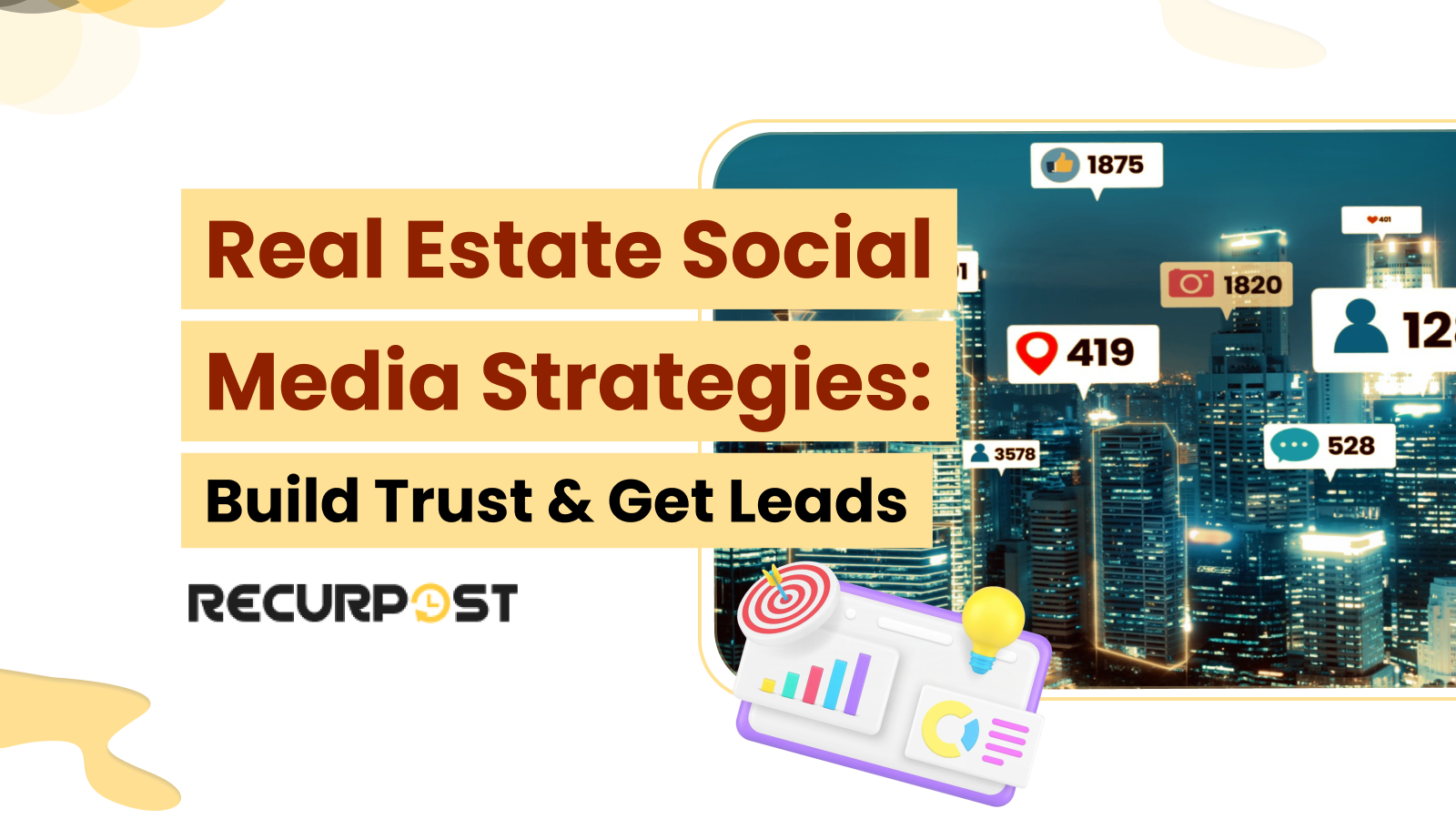Real estate social media strategies boost reach, build trust, and generate leads without requiring constant online attention. These strategies help real estate agents share valuable posts, connect with local audiences, and strengthen their brand voice on social platforms.
Social media generates qualified leads in real estate by matching engaging content with the right audience. A well-planned real estate social media marketing strategy uses short videos, visual content, and quick updates to build awareness and keep property listings visible.
How is Social Media Marketing Driving Leads in Real Estate?

Real estate social media strategies enable agents to grow their presence and connect with target audiences beyond listing posts. Estate social media marketing uses relationship building, insight sharing, and consistent visibility to capture more leads in competitive markets.
Regular posts such as market updates, success stories, and behind-the-scenes moments position agents as trusted experts. A thoughtful real estate social media marketing presence boosts brand awareness and supports long-term business growth
Why Social Media Can’t Be Ignored in Real Estate
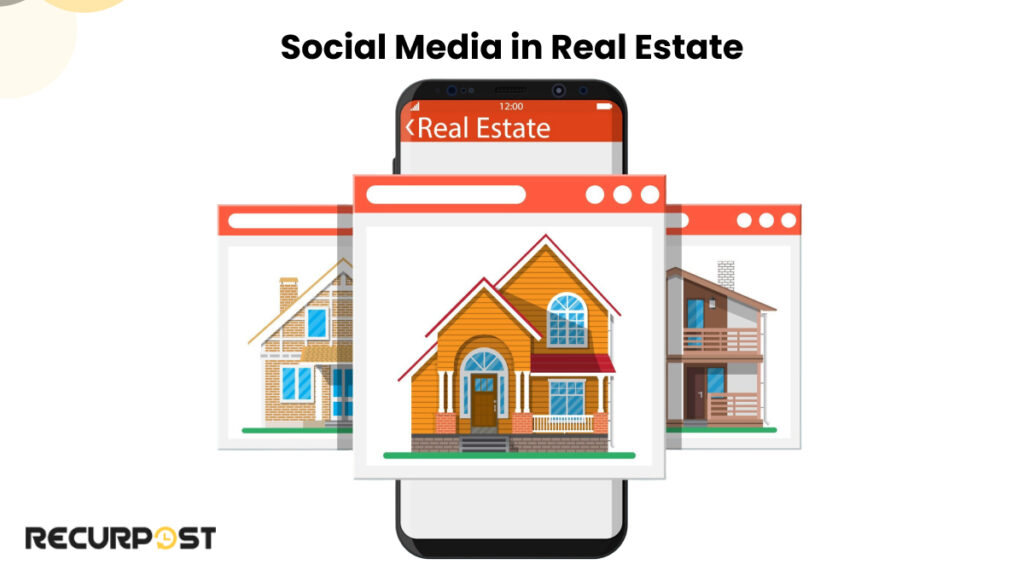
More than half of homebuyers research online before contacting real estate agents, which makes digital first impressions more common than face-to-face meetings.
Real estate social media strategies now serve as the main channel where people discover agents, view properties, and build trust.
Social media marketing costs less than traditional advertising while delivering higher-quality real estate leads through targeted content aimed at specific audiences.
The crowded real estate industry shows varied execution quality online. Audiences ignore listing-only posts, so agents need diverse content that sustains interest and memorability.
Agents do not need advanced marketing expertise for social media success. Smart posting and consistency drive results, which this guide explains in detail.
Pick the Right Social Media Platforms for Your Real Estate Business
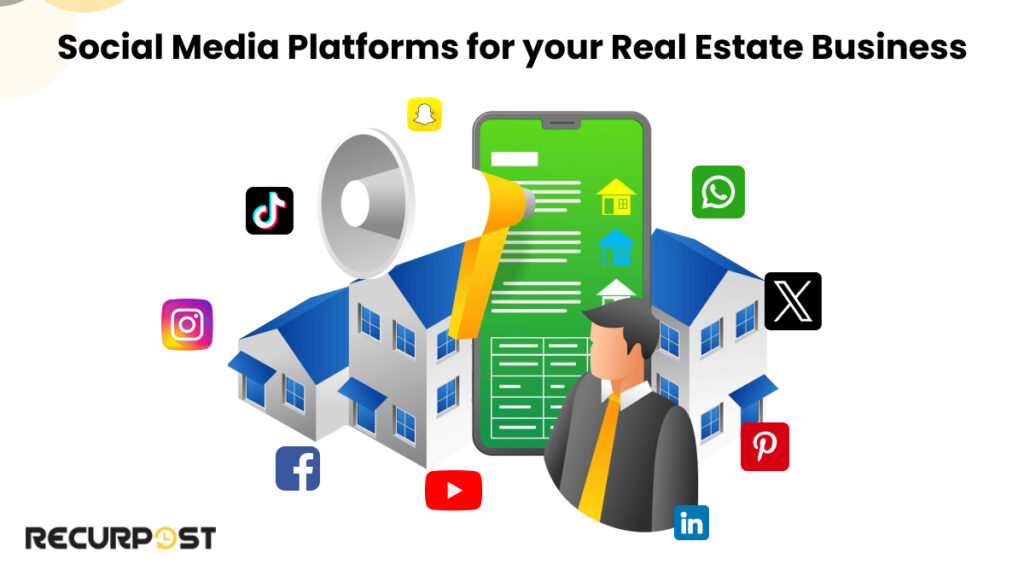
Social media platforms differ in style and demographics. Real estate social media strategies work best when agents select platforms where potential clients already spend time.
Facebook attracts home browsers, supports listing posts, ad campaigns, and community group participation. It also maintains communication with past real estate clients.
Instagram thrives on visuals. Stories, Reels, and carousels suit property showcases, behind-the-scenes content, and quick real estate tips.
LinkedIn connects professionals, builds referral networks, and strengthens credibility within the real estate industry.
TikTok
TikTok generates attention through short home tours and daily routines. Personality-driven content captures viral reach and builds familiarity with real estate brands.
YouTube
YouTube works for longer content such as virtual tours, area guides, and real estate Q&As. Real estate videos grow audiences slowly but maintain long-term relevance.
Start with two platforms, maintain a consistent posting schedule, communicate authentically, and track engagement. Strong habits make expansion easier.
How Solo Agents and Teams Can Use Social Media Differently

Real estate social media strategies benefit both solo agents and teams, though execution differs depending on business structure.
Solo real estate agents gain from personal stories, behind-the-scenes content, and face-to-camera tips. Authentic posts build trust, connect with buyers, and stand out on crowded platforms.
Teams highlight strengths through introductions, agent wins, and collaboration posts. These efforts build credibility and show seamless service, creating an edge in local markets, ultimately benefiting real estate marketing.
Both solo and team methods succeed when content reflects real client service and authentic experiences.
Real Estate Tip: Whether you operate solo or lead a team, consistency and authenticity win when paired with high-quality photos and storytelling that sparks engagement.
What Are the Best Real Estate Social Media Strategies Today?

Success with real estate social media strategies comes from showing up, standing out, and staying consistent.
Most real estate professionals maintain social media accounts, but account ownership alone does not bring leads. Sporadic listing posts signal inactivity and weaken connections.
Real estate businesses need a clear plan that showcases homes, connects with buyers, and maintains visibility without constant online efforts.
A real estate social media marketing plan includes choosing the right platforms and creating content that connects with the target audience.
You’ll discover time-saving techniques, outreach methods, and content ideas that convert followers into qualified real estate leads.
Use Visuals That Make People Stop Scrolling
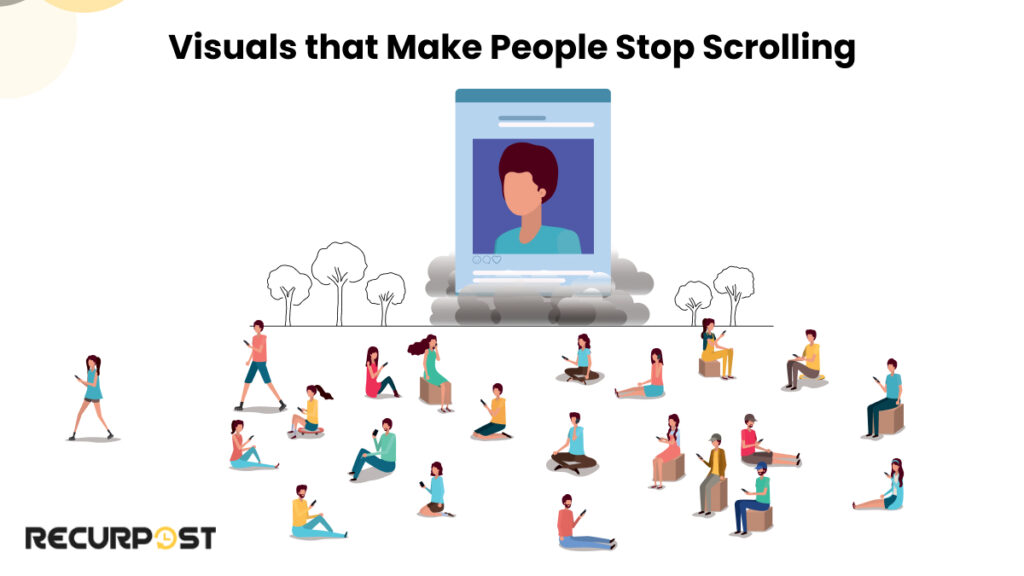
Generic listing photos get skipped quickly on social media platforms. Eye-catching visuals are central to real estate social media strategies.
Real estate naturally produces strong visual content: photogenic homes, styled rooms, and striking views. Videos boost performance by driving more views and engagement.
Here’s what works:
- Short home tours (2–3 minutes max)
- Before-and-after photos of staging or renovations
- Time-lapse clips of open-house setups
- Quick tips with a face-to-camera format
Use vertical videos for Instagram and TikTok. Square or landscape works better for Facebook and YouTube. Always add captions: many people scroll real estate videos with sound off.
Smartphone cameras work well in real estate marketing if paired with good lighting and stable recording. Editing tools like Canva or InShot raise video quality and shareability.
Mini-stories expand reach. “Just sold this home in 3 days” becomes powerful when paired with buyer photos. Every successful real estate social media content creator uses this method.
Visual content builds familiarity and trust. Strong visuals help convert social media presence into qualified real estate leads.
Post Often Enough to Stay Remembered
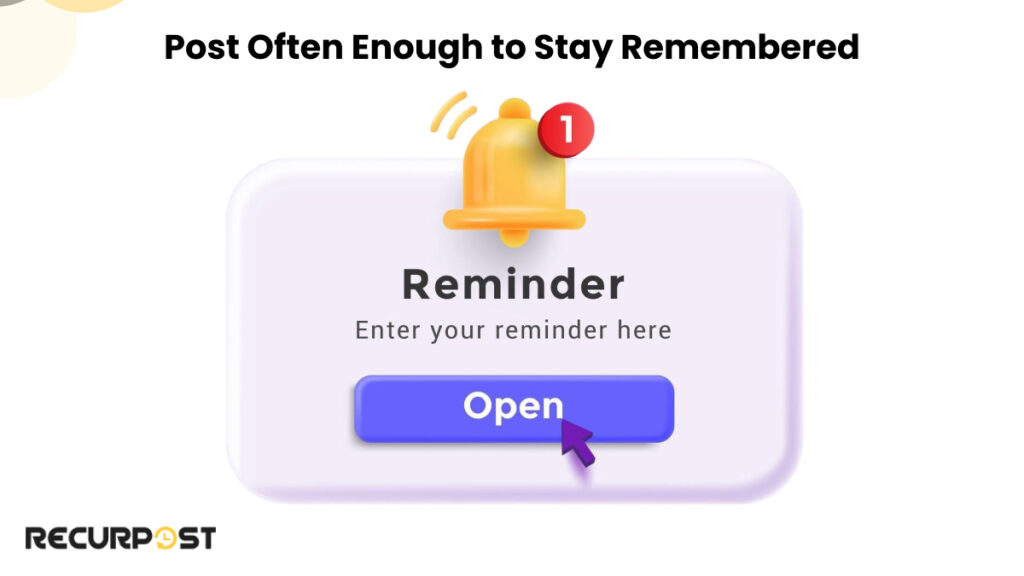
Infrequent posting weakens real estate marketing and makes audiences forget. On social media, visibility directly connects with memorability, which impacts real estate lead flow.
Posting 5–7 times weekly keeps agents visible without hourly updates. Daily posts or high-engagement day clusters sustain presence.
Here’s a simple mix that works for real estate marketing:
- 2 property listings
- 1 real estate market update
- 1 quick tip or Q&A on the market
- 1 client story or testimonial of the market
- 1 fun or personal post of the market
Content batching and scheduling with tools like RecurPost streamlines posting and reduces constant monitoring.
Best posting times are often 9 AM and early evening (6–8 PM). Audience analytics may highlight different peak hours.
Consistent presence supports trust and keeps real estate social media strategies visible in feeds, maintaining audience awareness and real estate business growth.
Use Automation to Maintain Consistency Without Burnout
Real estate professionals juggle many daily tasks, so manual social media management often competes with client service.
Social media automation tools turn sporadic posting into steady lead generation. These tools maintain presence across platforms while saving time. Many agents use real estate social media marketing templates to simplify planning.
Automate these in real estate social media marketing:
- Content scheduling: plan and schedule a week of posts in one sitting to keep property listings and updates consistent.
- Cross-platform publishing: create once and share across multiple networks to expand reach for real estate audiences.
- Recurring evergreen content: set timeless market tips and testimonials to repost automatically, keeping strategies active even on slower weeks.
- Analytics collection: track performance metrics without manual data gathering to refine real estate social media strategies over time.
Automation in the real estate market requires setup, but saves time long-term. Batch content types like listing announcements, market updates, and client testimonials. Schedule them with tools such as RecurPost.
Automation works best with a content calendar outlining post types, platforms, and posting frequency. This method balances content variety and supports brand consistency.
While automating distribution, keep engagement authentic by replying personally to comments and messages. Strong real estate social media strategies balance automation with human connection.
Social media automation shifts from a time-consuming task to a background system for lead growth. It lets agents focus on closing deals while staying visible online.
Write Captions That Sound Like A Human (Not Robotic)

Attractive photos capture attention, but captions keep audiences invested. Strong captions strengthen real estate social media strategies by sparking conversation.
Skip aggressive sales language. Repetitive posts like “Stunning 3BHK available now!!!” cause audiences to disengage.
Write conversationally. Keep content concise, authentic, and easy to read.
Here’s what works:
- Ask questions: “Would you live in a place like this?” Questions spark engagement and keep conversations going.
- Tell mini stories: “The last buyers walked in and said, ‘This is the one.’” Stories build trust and create memorable content.
- Share value: “3 things to ask before buying a condo in Atlanta.” Educational posts strengthen credibility and attract qualified leads.
- Use emojis sparingly: Emojis break up text but should support, not overwhelm, captions in real estate posts.
- Add calls to action: Not always “DM me”, sometimes “Save this for later” fits better with real estate content flow.
Mix fun, educational, and emotional posts. Content variety prevents a robotic presence and keeps real estate audiences engaged.
Real estate social media strategies connect best through human communication styles that feel authentic, not automated.
Use Hashtags and Tags That Get Seen

Hashtags improve post discoverability. Random accumulation, however, delivers little value in real estate social media strategies
Use 10-15 relevant hashtags per post, including:
- Location based: #AustinRealEstate, #DallasHomes
- Property type: #ModernHome, #LuxuryListing
- Audience-focused: #FirstTimeBuyer, #InvestInProperty
- Trend-based: #JustListed, #HomeGoals
Rotate hashtags between posts. Instagram’s algorithm favors variety, keeping real estate content fresh.
Tag stagers, clients, and other partners to extend reach and show collaboration in real estate marketing.
Tag local landmarks such as parks or cafes. This draws local attention and reinforces the area’s credibility in real estate marketing.
Smart hashtags and tags expand reach beyond followers. They strengthen real estate social media strategies without added ad spend.
Track What’s Working and Drop What’s Not
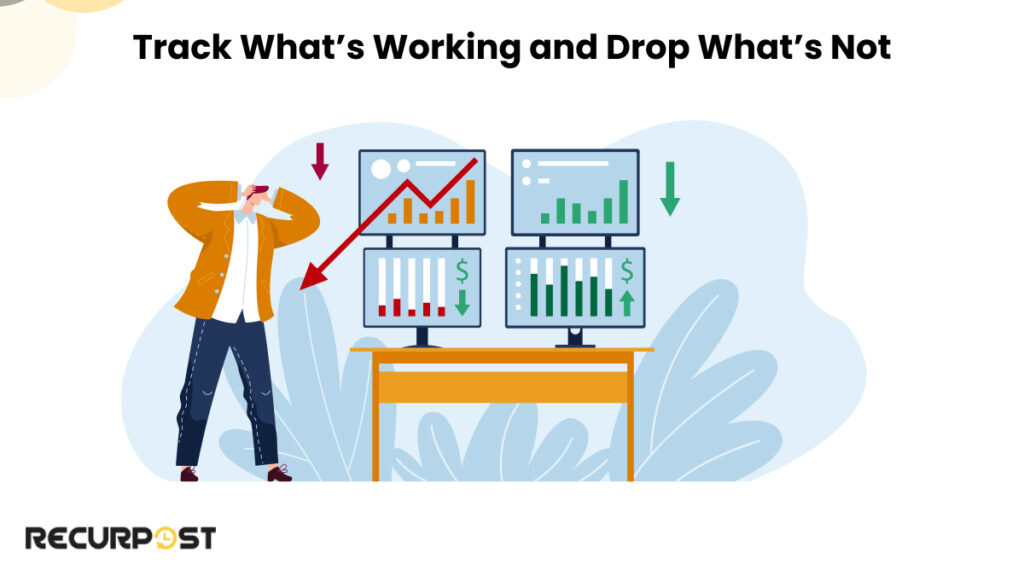
Tracking results outperforms guesswork and prevents burnout from random posting.
Social media platforms provide analytics that guide real estate social media strategies:
- Likes, shares, and comments: measure engagement and show how well posts connect with audiences.
- Saves and shares: signal audience value and indicate which real estate posts are worth repeating.
- Profile visits and clicks: show interest in learning more about agents, listings, or services.
- Reach and impressions: reveal how many people saw content and help refine future real estate social media strategies
Identify top-performing content such as video tours, local tips, and client stories. Post more of what performs well.
Spot underperforming content, such as weak market updates or memes. Use that data to refine future posting.
RecurPost tracks analytics and recycles top-performing content for consistent reach.
Watching engagement patterns, such as what stops scrolling versus what gets ignored, helps refine real estate social media strategies over time
Turn Followers into Real Leads (With Zero Pressure)

Follower counts in real estate marketing without conversions add little value. Constant pitching pushes audiences away, while smart real estate social media strategies turn followers into qualified leads.
Provide contact options for audience-initiated engagement in real estate marketing.
Here’s how:
- Add contact info in your bio: Make calling, texting, or messaging simple. Direct contact builds trust and supports lead-driven real estate social media strategies.
- Use “Link in bio” tools: Send traffic to listings, your website, or a booking calendar. This aligns social content with business goals.
- Drop gentle reminders in posts: Say “DM me for a walkthrough” or “Message me for open house times.” These reminders turn engagement into real estate leads.
- Start chats in Stories and DMs: Ask “Looking to buy this year?” or “Curious what your home’s worth?” Conversational outreach drives stronger real estate connections.
Familiarity increases outreach likelihood in real estate marketing. Authentic content builds comfort and trust, making real estate social media strategies memorable when clients need services or new property updates.
Build a Brand Voice That Sticks

Brand includes online presence, communication style, and emotional impact. Captions, videos, and comments all shape voice. Staying current with real estate social media trends helps refine identity within real estate social media strategies.
Inconsistent tone in real estate reduces memorability. A consistent voice across platforms builds familiarity and strengthens real estate social media strategies.
Here’s how to make your voice stick:
- Calm and professional, or friendly and upbeat. Stick with it across platforms to support a consistent real estate strategy.
- Use similar phrases in posts and videos. Familiar language builds recognition and trust.
- Add personal stories: share behind-the-scenes from a showing or why you entered real estate. Stories create a connection with your audience.
- Stick to colors and fonts in graphics. Visual consistency makes content recognizable in busy feeds.
Trust drives success in the real estate industry. Personal connection with the account owner increases outreach likelihood over competing agents.
Talk Back, Don’t Just Post and Ghost

Ignored comments in real estate marketing are missed opportunities. Engagement is a two-way exchange and part of strong real estate social media strategies.
Make time to strengthen your real estate social media strategies:
- Reply to comments: even a quick “Thanks!” shows attention and strengthens connections in a real estate profile.
- React to Stories where people tag you. Acknowledge supporters to keep relationships warm.
- Answer DMs quickly. Delayed replies reduce the chances of converting interest into real estate leads.
- Comment on local pages or with nearby businesses. This builds visibility in your community.
Spending 10–15 minutes daily on engagement maintains real estate social profile presence without demanding full-time attention.
Algorithms reward interactions, pushing content higher in feeds.
Consistent engagement turns followers into clients and proves that social media in real estate is about conversation as much as content.
Stick With It for 90 Days (That’s When It Pays Off)
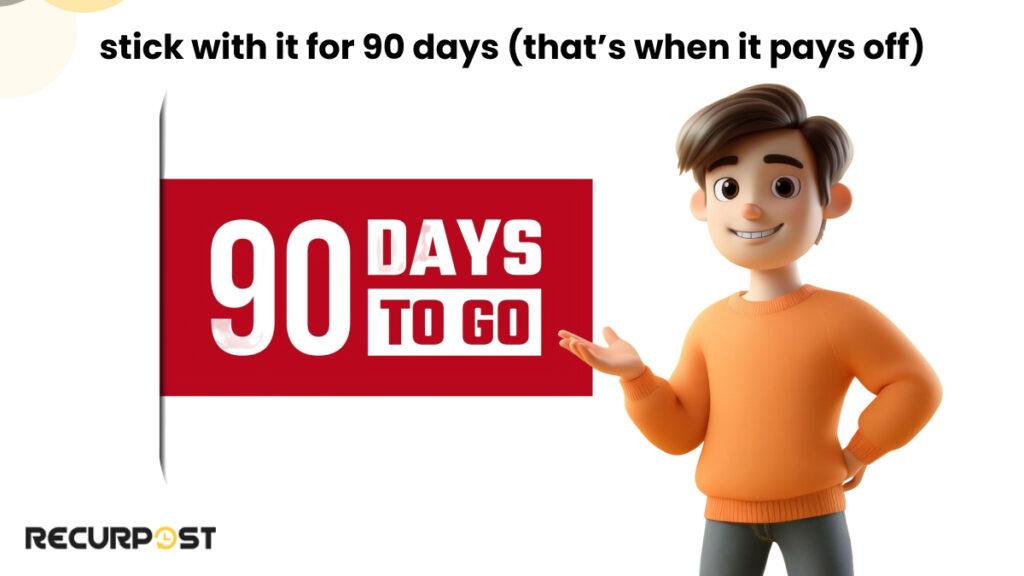
Social media produces gradual, not instant, results. Posting rarely brings immediate clients, but steady effort supports strong real estate social media strategies.
A 90-day commitment to regular posting, testing content, tracking performance, and engaging audiences delivers measurable results.
Many real estate agents quit after two weeks with no visible results. Three months of consistent posting generate calls, messages, and new transactions.
Statistics confirm how real estate social media strategies perform when applied consistently:
- 90 days of consistent posting deliver measurable reach growth.
- Weekly video posting generates 4x more reach
- Social media generates 60% of real estate leads
Consistency outweighs perfection; small lighting or caption flaws matter less than showing up regularly in real estate social media strategies.
Long-term success with real estate social media strategies depends on sustained commitment and consistent activity.
Conclusion
Let Social Media Work While You Work
Social media presence should support real estate work, such as showings, client meetings, and closings, without creating added stress
Begin with modest posting, several times weekly, to build a consistent real estate social media strategy. Strong real estate social media strategies show your process, celebrate wins, provide value, and maintain consistency.
After 90 days, social media shifts from an obligation to a system for lead generation, trust-building, and real estate transactions.
Established real estate social media strategies keep generating results on their own, even during non-working hours.
FAQs on Real Estate Social Media Strategies
1. How do I get more local followers?
Tag local spots, use city-based hashtags, and share community highlights. Content featuring local businesses and events attracts nearby buyers and sellers.
2. What kind of video content works best for real estate agents?
Short walkthroughs, “Just Sold” stories, market insights, and personal introductions perform well. This type of video content educates, builds trust, and keeps audiences engaged. Aim for 2–3 minutes with clear visuals and good lighting.
3. Do paid ads work on social media for real estate?
Yes. Paid ads help with open houses and retargeting, while organic content builds trust. Strong real estate social media strategies balance paid ads with organic posting.
4. How can I manage multiple social media platforms without getting overwhelmed?
Use a content calendar and scheduling tools like RecurPost for real estate social media management. Begin with one or two platforms, then expand as consistency grows.
5. What’s the best social media platform for real estate agents?
Instagram and Facebook are ideal for estate social media marketing, great for sharing listings, stories, and behind-the-scenes posts. Instagram Stories, in particular, are powerful for keeping your audience engaged. LinkedIn helps connect with other real estate professionals.
6. Should I use TikTok for my real estate business?
Yes, if younger buyers are your target audience. Short real estate social media content, such as tips, property clips, and behind-the-scenes videos, drives engagement and may go viral.
7. How do I handle negative comments or trolls?
Reply politely to valid concerns. Delete or block spam. A professional tone strengthens brand presence and keeps your real estate social media pages safe.
8. Should I use my personal account or create a business account?
Create a business account. It unlocks analytics, ad tools, and insights. Business profiles align with professional real estate strategies better than personal accounts.

As a passionate content writer, I love blending creativity with research to craft compelling narratives that inform, engage, and inspire. With a strong focus on user engagement and brand communication, I create content that resonates with the audience and drives meaningful interactions.

